.
18.05.2016
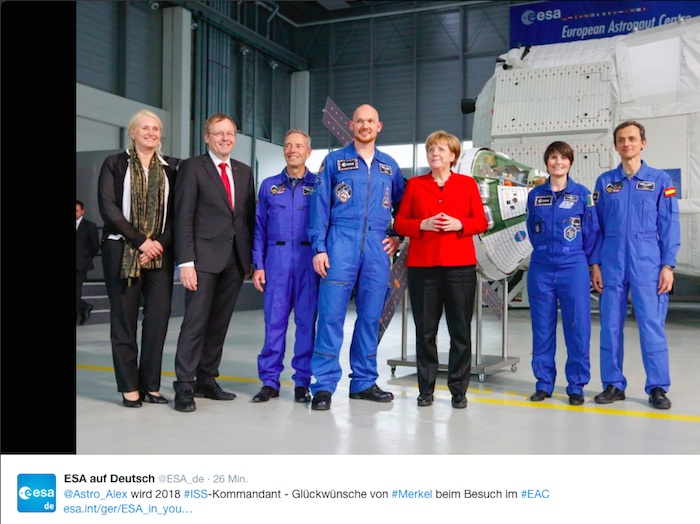
Bundeskanzlerin Angela Merkel gratuliert ESA-Astronaut Alexander Gerst zu seiner zweiten Mission auf der ISS im Jahr 2018 und zu seiner Rolle als Stationskommandant.
-
ESA-Astronaut Alexander Gerst wurde für 2018 für eine neue sechsmonatige Mission zur Internationalen Raumstation ISS benannt, wobei er in der zweiten Hälfte seiner Einsatzzeit die Rolle des Stationskommandanten innehaben wird.
Diese Nachricht wurde heute im Beisein von Bundeskanzlerin Angela Merkel von ESA-Generaldirektor Jan Wörner im Europäischen Astronautenzentrum in Köln verkündet. Gerst hielt sich bereits 2014 im Rahmen seiner Mission Blue Dot sechs Monate lang auf der ISS auf.
Zu seiner erneuten Ernennung gab er zu Wort: "Ich fühle mich sehr geehrt, dass man mir das Kommando über die Internationale Raumstation übertragen wird. Dieses internationale Zeichen des Vertrauens spiegelt die Zuverlässigkeit der ESA als Kooperationspartner wider, und wurde ermöglicht durch die großartige Arbeit meiner europäischen Kollegen während der vorherigen Missionen. Ich freue mich natürlich über die Gelegenheit, die langjährige Tradition der Wissenschaft auf der ISS weiterzuführen, und besonders auch darüber, meinen Beitrag zu einem der größten Explorationsabenteuer der Menschheit leisten zu dürfen, um neue Horizonte zu erforschen."
Zusammen mit den USA, Russland, Japan und Kanada sind über die ESA 11 europäische Staaten an der ISS beteiligt. Zurzeit arbeitet ESA-Astronaut Tim Peake auf dem orbitalen Außenposten, im November soll ihm sein Kollege Thomas Pesquet nachfolgen.
Alexander Gerst wird der zweite europäische Stationskommandant auf der ISS sein
Gersts zweite Mission wird u. A. der Fortsetzung von Forschungsprogrammen dienen, deren Dauer sich oft über mehrere ISS-Missionen erstreckt. Darüber hinaus wird er voraussichtlich mit dem ESA-Trainingssystem MARES zur Erforschung von Muskelschwund arbeiten, Plasmakristalle in der Schwerelosigkeit untersuchen, neue Technologien zur Unterstützung des ESA-Programms für bemannte Exploration testen und weitere Experimente für die an der Raumstation beteiligten Partner durchführen.
Mit Gerst ist nach Frank De Winnes Mission 2009 nun zum zweiten Mal in der 15jährigen Einsatzzeit der ISS ein europäischer Astronaut zum Stationskommandanten benannt worden. De Winne, der heute das Europäische Astronautenzentrum leitet, erklärte: "Gerst zeichnete sich bei seiner Mission Blue Dot durch hervorragende Leistungen, hohe Fachkompetenz und ausgezeichnete Interaktionsfähigkeiten aus. Deshalb hat ihn das Europäische Astronautenzentrum unseren internationalen Partnern als Stationskommandant der ISS vorgeschlagen."
Gersts zweite Mission erstreckt sich von Mai bis November 2018 auf Expedition 56 und 57, wobei er für Expedition 57 die Rolle des Stationskommandanten übernehmen wird.
In das Europäische Astronautenkorps wurde Gerst 2009 aufgenommen, 2011 wurde er zum ersten Mal für eine Mission eingeteilt. Nach seinem 166tägigen Aufenthalt im Weltraum wurde ihm 2015 das Bundesverdienstkreuz verliehen.
.
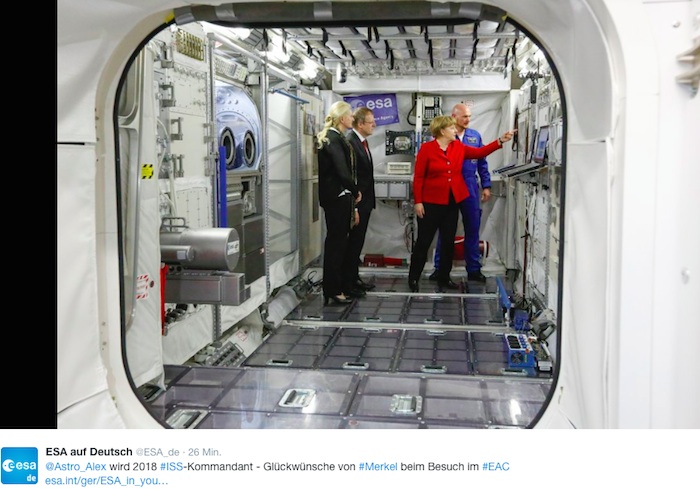
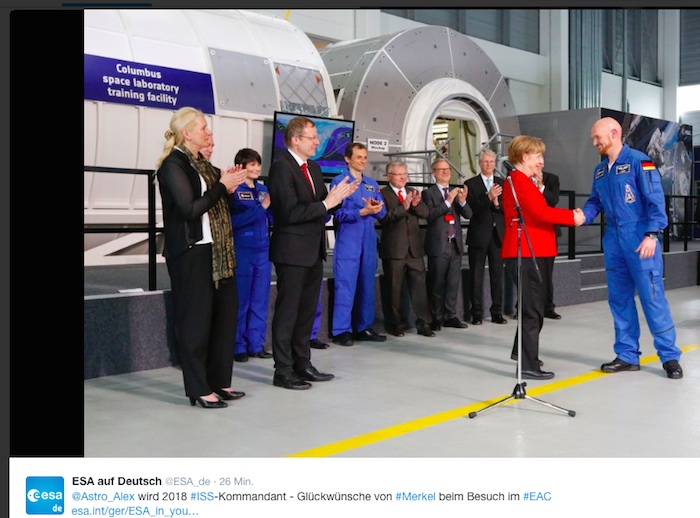
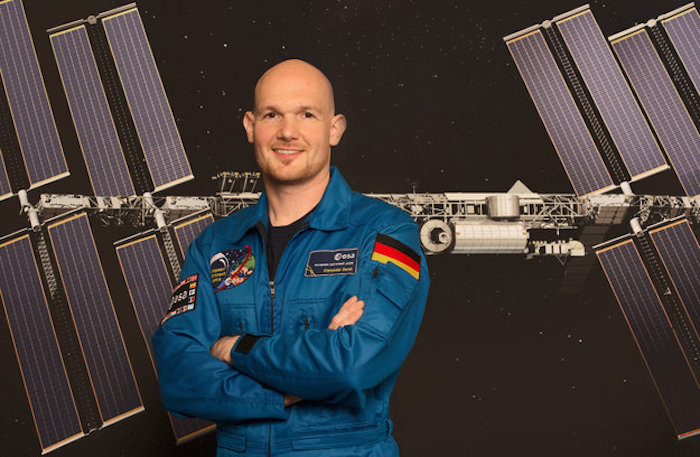
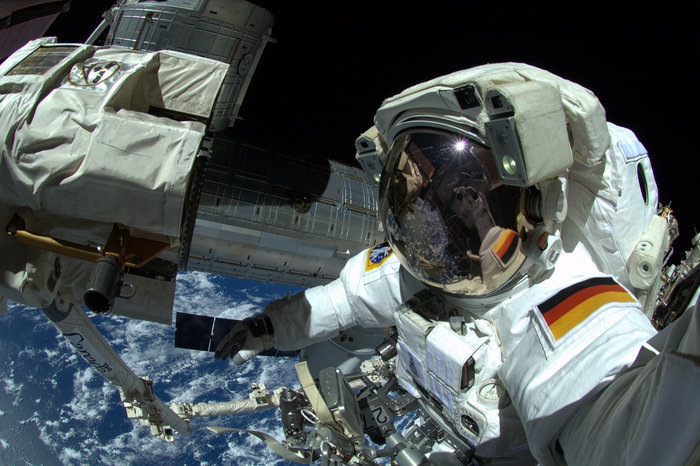
Quelle: ESA
-
Update: 20.05.2016
.
Mars is Within Reach, Says German Tapped for Space Command
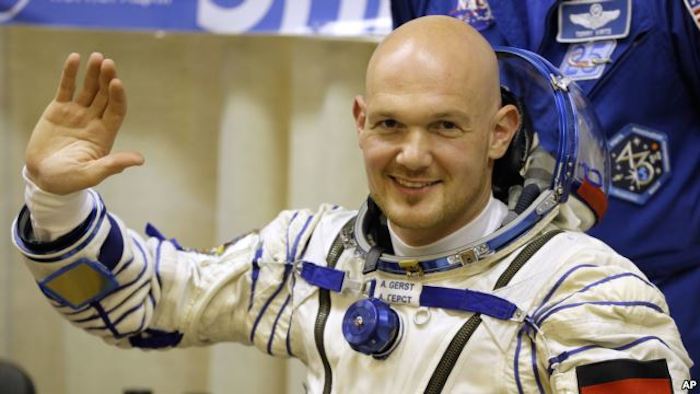
COLOGNE, GERMANY —
Humans could set foot on Mars within decades if they wanted to, according to the German astronaut who has been tapped to become his country's first commander of the International Space Station.
Alexander Gerst said the space station offers a unique opportunity to test the technology needed to explore other planets, especially if its lifetime is extended beyond 2020.
“It is very clear to me that those manned missions to the moon and Mars, human missions, will happen,'' he told The Associated Press in an interview at the European Space Agency's astronaut training center in Cologne, Germany. “But we need the decision as a society. And once we do that we are ready to go, basically.''
Gerst said the recent Hollywood movie The Martian — starring Matt Damon as an astronaut fending for himself on the red planet — offers a realistic glimpse of the not-too-distant future.
.
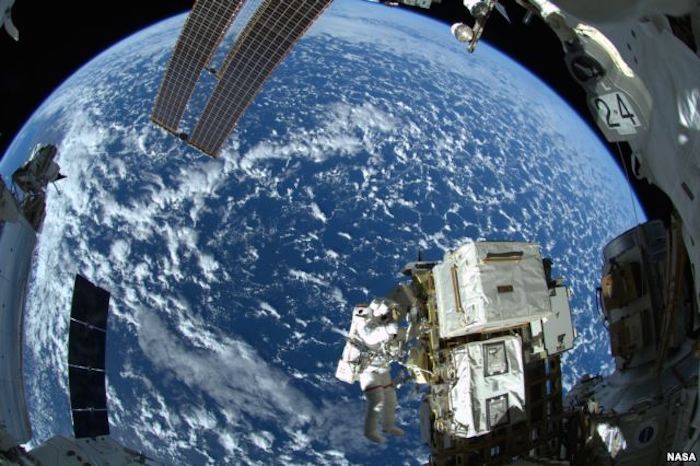
FILE - NASA astronaut Reid Wiseman (pictured here) and European Space Agency astronaut Alexander Gerst completed the first of three spacewalks for the Expedition 41 crew aboard the International Space Station, Oct. 7, 2014. (NASA/ESA/Alexander Gerst)
-
“It shows us what we can possibly reach in a few years' time,'' he said. “I'm actually quite excited by the fact that us humans, we could fly to Mars, and maybe you and I will live to see it.''
Europe’s role
The 40-year-old volcanologist — an expert on volcanos — is scheduled to take command of the space station in May 2018, four years after his first mission, it was announced Wednesday.
Astronauts have been living continuously aboard the 250-mile (402-kilometer) high complex since 2000. This month, the space station hit the milestone of 100,000 orbits around Earth — the equivalent to 10 round trips to Mars, or almost one way to Neptune.
Gerst will be the second European Space Agency astronaut in charge of the orbital outpost, after Belgian pilot Frank De Winne, reflecting Europe's growing interest in space. German Chancellor Angela Merkel, who was present for the announcement and who is a scientist by training, said recently it was “right and important'' that space exploration should play a key role in her country's high-tech strategy.
The European Space Agency saw its budget increase almost 20 percent this year to 5.25 billion euros ($5.96 billion) and the agency is on course to activate Europe's satellite navigation system Galileo — a rival to the American GPS, Russia's Glonass and China's Beidou systems — this decade.
Space station’s future
Earlier this year, ESA chief Jan Woerner suggested establishing a village on the moon once the International Space Station reaches the end of its lifetime. There are no concrete plans for this yet, though, and experts say the space station hasn't outlived its usefulness — over 100 experiments are conducted during each mission to the space station.
Gerst said the flying laboratory can help test whether humans are physically and psychologically capable of spending long periods of time in deep space and also how to conserve precious resources on Earth.
“In this year, we decide whether to continue the International Space Station until 2024, whether Europe is part of that and whether we will use that investment that we made in the past,'' he said. “So it is important not to stop investing in this field.''
Quelle: Voice of America
4775 Views
